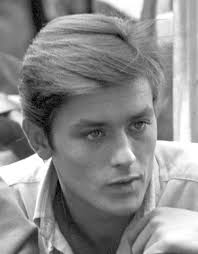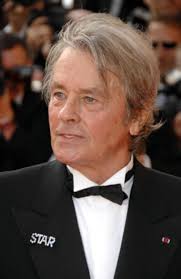Alain Delon, born on November 8, 1935, in Sceaux, a suburb of Paris, France, is one of the most iconic
actors in European cinema, known for his striking looks,
enigmatic screen presence, and complex performances.
Over a career spanning more than five decades, Delon
became synonymous with the suave, brooding anti-hero, leaving an indelible mark on French and international cinema.
Table of Contents
Alain Delon Early Life and Introduction to Acting

Alain Delon’s early life was marked by instability. His parents divorced when he was young, and he spent much of his childhood
moving between different foster homes and schools. This nomadic childhood contributed to the rebellious and restless spirit that would later define many of his film characters.
At 17, Delon joined the French Navy, hoping to find a sense of direction and purpose. However, his time in the military was marked by disciplinary issues, leading to a premature discharge. Upon returning to France, Delon struggled to find his footing, taking on various
odd jobs before a chance encounter with a film producer at the Cannes Film Festival in 1956 set him on the path to acting.
Rise to Stardom
Delon’s early foray into acting was met with immediate success. He was cast in his first significant role in Christine (1958), where he starred alongside Romy Schneider. The film was a hit, and Delon and Schneider’s on-screen chemistry blossomed into a
real-life romance, captivating the public and media. Their relationship lasted several years, and although they eventually separated, they remained close friends until Schneider’s untimely death in 1982.

Delon’s breakthrough role came in 1960 with Purple Noon (Plein Soleil), directed by René Clément. In this adaptation of Patricia Highsmith’s novel The Talented Mr. Ripley, Delon portrayed the charming but psychopathic Tom Ripley. His performance was widely acclaimed, and the film
showcased his ability to blend charm with menace, a combination that would become his trademark. His portrayal of Ripley solidified his status as a rising star in European cinema.
Collaboration with Luchino Visconti
One of the most significant collaborations in Delon’s career was with the Italian director Luchino Visconti. In 1960, Delon starred in Visconti’s Rocco and His Brothers
(Rocco e i suoi fratelli), playing the title role of Rocco Parondi. The film, a powerful drama about a rural family struggling to survive in Milan, allowed Delon to display a
more vulnerable and emotional side, earning him critical
acclaim and cementing his reputation as a serious actor.

Their collaboration continued with The Leopard (Il Gattopardo) in 1963, where
Delon played the young and ambitious Tancredi Falconeri opposite Burt Lancaster and Claudia Cardinale. The film, set during the Italian unification, is considered one of Visconti’s
masterpieces and remains one of Delon’s most celebrated performances.
His role as Tancredi, a character torn between tradition and progress,
mirrored Delon’s own internal conflicts as he navigated the changing landscape of European cinema.
International Success and Iconic Roles
Throughout the 1960s and 1970s, Alain Delon became a global star, thanks
in part to his striking appearance and the international appeal of European cinema during this period. He often played complex, morally ambiguous characters, a reflection of the era’s shifting attitudes towards heroism and villainy.
In 1967, Delon starred in Le Samouraï, directed by Jean-Pierre Melville. The film, a minimalist, noir-influenced thriller, featured Delon as Jef Costello, a solitary hitman with a strict code of honor. Delon’s portrayal of Costello, with his icy demeanor and precise, almost ritualistic behavior, became one of his most iconic roles. Le Samouraï is now considered a classic, influencing generations of
filmmakers and cementing Delon’s status as a symbol of cool detachment.
Alain Delon collaboration with Melville continued with Le Cercle Rouge (1970),
where he played another stoic criminal, this time in a heist film. Once again, Delon’s performance was marked by his ability to convey a sense of inner turmoil and existential ennui beneath a
calm, controlled exterior.
Personal Life and Public Image
Alain Delon’s personal life has often been as intriguing as his on-screen roles. His relationships, particularly with Romy Schneider and later with actress Nathalie Delon, have been the
subject of much public and media interest. Delon married Nathalie in 1964, and they had a son,
Anthony Delon, who would later follow in his father’s footsteps and become an actor. The marriage, however, was short-lived, ending in divorce in 1969.
Delon has also been linked to several scandals and controversies, including
connections with the French criminal underworld, which further fueled his bad-boy image. Despite these controversies, or perhaps because of them, Delon maintained a complex, enigmatic public persona that only added to his allure as an actor.
Later Career and Legacy
In the 1980s and 1990s, Alain Delon career began to wind down, although he
continued to work in film and television. He took on fewer leading roles, often playing elder statesmen or supporting characters. Despite the reduced output, his presence in the film industry remained significant.
Alain Delon later years have been marked by a certain melancholy and reflection. He has spoken openly about feeling alienated from the modern world and the changes in the film industry. In 2019, at the Cannes Film Festival, Delon was awarded an honorary Palme d’Or for his
contribution to cinema, a recognition of his enduring impact on the art form.
Throughout his career, Alain Delon has embodied a particular
ision of masculinity, one marked by beauty, mystery, and a deep undercurrent of existential angst. His performances have left a lasting impression on cinema,
particularly in the genres of film noir and crime drama,
where his portrayal of conflicted, morally ambiguous characters set a new standard.
indianfastearning.comDMK must go for a Viksit Bharat and Viksit Tamil Nadu Annamalai exclusive 2024
Conclusion
Alain Delon legacy as an actor is one of both style and substance. His on-screen charisma, combined with his ability to convey complex, often contradictory emotions,
made him a favorite among some of the most respected directors of his time. Off-screen, his life has been marked by the same intensity and complexity that characterized his most memorable roles.
www.youtube.comhttp://Alain Delon







